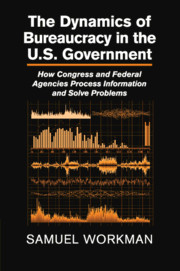 The Dynamics of Bureaucracy in the US Government
The Dynamics of Bureaucracy in the US Government Book contents
- Frontmatter
- Contents
- List of Illustrations
- List of Tables
- Acknowledgments
- 1 Bureaucracy and Problem Solving
- 2 The Dual Dynamics of the Administrative State
- 3 The Regulatory Process as an Attention Mechanism
- 4 Problem Monitoring in the Administrative State
- 5 Problem Prioritization and Demand for Information
- 6 Problem Solving and the Supply of Information
- 7 Information, Bureaucracy, and Government Problem Solving
- Appendix A Conceptualization and Measurement
- Appendix B Statistical Models
- References
- Author Index
- Subject Index
Appendix A - Conceptualization and Measurement
Published online by Cambridge University Press: 05 May 2015
- Frontmatter
- Contents
- List of Illustrations
- List of Tables
- Acknowledgments
- 1 Bureaucracy and Problem Solving
- 2 The Dual Dynamics of the Administrative State
- 3 The Regulatory Process as an Attention Mechanism
- 4 Problem Monitoring in the Administrative State
- 5 Problem Prioritization and Demand for Information
- 6 Problem Solving and the Supply of Information
- 7 Information, Bureaucracy, and Government Problem Solving
- Appendix A Conceptualization and Measurement
- Appendix B Statistical Models
- References
- Author Index
- Subject Index
Summary
The empirical foundation of my argument is a large database of all rules promulgated by the federal bureaucracy from 1983–2008. The database contains 226,710 rulemaking actions and represents the most comprehensive database of bureaucratic policy making that exists to date. This Appendix describes the nature of the data and the data collection, coding, and analysis of the rules.
This discussion proceeds from the conceptualization of the bureaucracy's agenda through indicators and measures used in the statistical analysis of the dual dynamics of agenda setting. I first offer several examples of rulemaking actions found in the Unified Agenda, the indicator of the bureaucracy's agenda used for this study. I then describe the topic coding of each entry in the Unified Agenda. This process involves expert-machine interaction in generating a dataset coded consistently and reliably over time. Finally, I discuss the measures associated with the communications model of agenda setting employed in the argument.
A.1 EXAMPLES OF RULES
To be clear, a rule is a regulation, in the same way that legislation can become a law. Rules are simply regulations that have not made it through the process of becoming a law. In Chapter 4, I offered two examples of rules, one issued by the Fish and Wildlife Service and one issued by the Farm Service Agency. Table A.1 contains two additional examples to illustrate the conceptualization and content coding of the bureaucracy's agenda. These rules happen to be extremely important in shaping public policy in two key areas in the United States. The first rule listed in Table A.1 concerns the establishment of the National Organics Program at the USDA. The rule represented a decade-long development of appropriate standards for organic certification, marketing, and substances that began with the passage of the Organic Food Production Act of 1990. Given its statutory authority and the date when the proposed rule was issued, this rule testifies the USDA's ability to draw on authority delegated long ago to address problems in the present time.
- Type
- Chapter
- Information
- The Dynamics of Bureaucracy in the US GovernmentHow Congress and Federal Agencies Process Information and Solve Problems, pp. 163 - 170Publisher: Cambridge University PressPrint publication year: 2015


